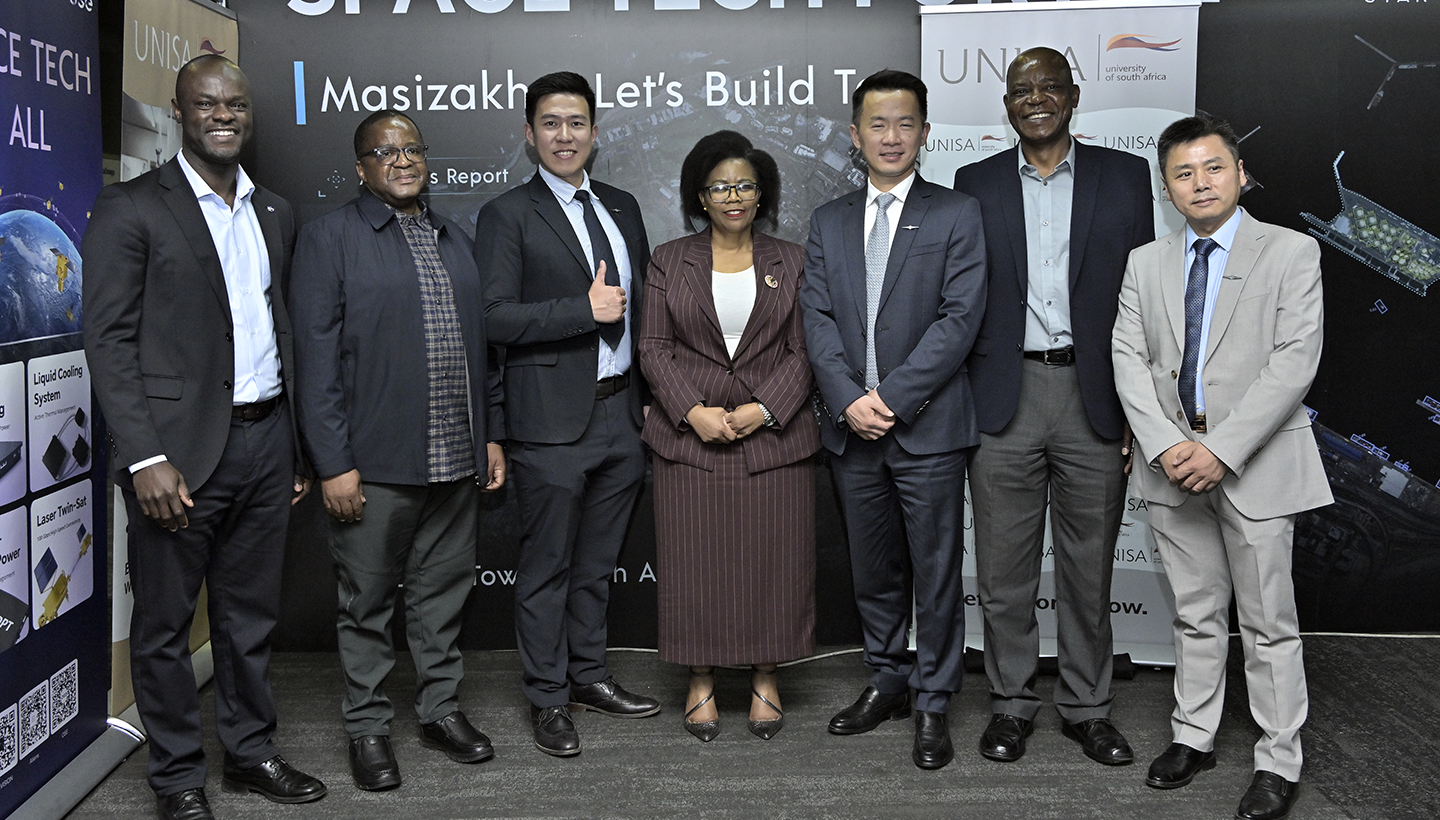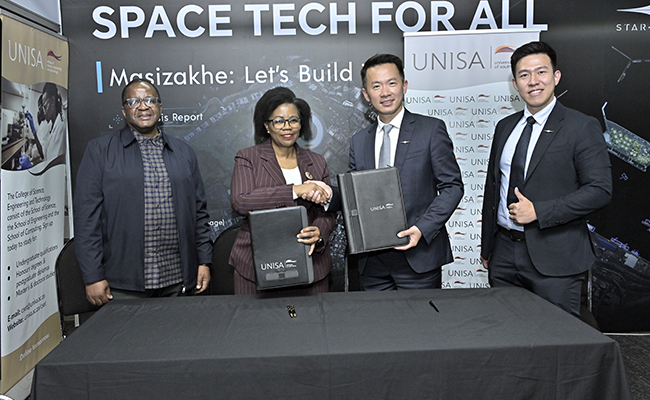News & Events
Unisa shoots for the stars with strategic international partnership in space sciences

From left: Prof James Chibueze (CSET's Department of Mathematical Sciences: Unisa), Prof Bhekie Mamba (CSET's Executive Dean: Unisa), Bruce Wei (Africa Business Manager: STAR.VISION), Prof Puleng LenkaBula (Principal and Vice-Chancellor: Unisa), Noor Fan (co-founder: STAR.VISION), Prof Ernest Mnkandla (Director of CSET'S CAIDS: Unisa), and Simon Huang (Chief Technology Officer: Aliens Aerospace)
On 20 August 2025, Unisa and STAR.VISION officialised a historic partnership by signing a memorandum of understanding (MoU) set to leverage STAR.VISION's cutting-edge satellite platforms and the university’s research expertise in artificial intelligence (AI) and data science. The signing ceremony was held at the Council for Scientific and Industrial Research’s International Convention Centre, which is currently hosting a space and innovation showcase.
The strategic partnership marks the official launch of the Spaceborne AI Algorithm Rideshare Programme, a collaborative initiative focused on the design, development, testing, and deployment of advanced AI algorithms for remote-sensing satellites. The collaboration accentuates a common commitment to fostering innovation and intensifies South Africa’s participation in the global space and AI sectors.
STAR.VISION is a renowned Chinese aerospace firm that is committed to advancing humanity’s computing paradigm from the Earth’s surface to low Earth orbit. The organisation operates China’s largest satellite, and provides solutions to space agencies and commercial entities in more than 40 countries, ensuring end-to-end technological sovereignty.
The partnership further entails the establishment of a joint research and development team that will lead the AI algorithm development efforts. Unisa’s role will be to design, develop, and optimise AI models, and to support the coordination of on-orbit testing. STAR.VISION will provide technical support, training, and relevant datasets, and oversee quality verification, uplink procedures, and on-orbit test operations aboard their satellites. Additionally, through mutual consent, the partners will collaboratively announce and publish research progress and successful outcomes of the programme through local and international news channels.

From left: Prof Bhekie Mamba, Prof Puleng LenkaBula, Noor Fan and Bruce Wei
Acknowledging Unisa as the largest university on the African continent, Noor Fan, co-founder of STAR.VISION, remarked: “It is an honour to work with Unisa to advance research and support academia in the space industry. This is the first agreement we signed with a South African educational institution.”
He continued: “We look forward to supporting students and academics in this field through the innovation and commercialisation of AI models”. Fan invited Unisa to the launch of their next satellite taking place in early 2026.
Unisa’s Principal and Vice-Chancellor (VC), Professor Puleng LenkaBula, commented as follows: “I am honoured and appreciative to partner with STAR.VISION to pivot Unisa’s work in the space sciences, and to collaboratively engender success.” The VC affirmed that the partnership will positively impact research, development and commercialisation, and unlock wider opportunities for Unisa in the said industry, considering the university’s global footprint. She continued: “We should cultivate partnerships that are as resourceful as this one – we should have multidisciplinary outcomes from this collaboration.”
Dr Angie Magabane, Director of Unisa’s Internationalisation and Partnerships Directorate, emphasised that the partnership is essential, and said that she is confident that it will bring mutually beneficial results. Additionally, Professor Bhekie Mamba, Executive Dean of Unisa’s College of Science, Engineering and Technology (CSET), said: “Unisa embraces the value of astronomy as a discipline, and through this partnership, the university’s global footprint will advance. It will also drive commercial value and help build new programmes that will benefit society, academia and future generations.”
Professor James Chibueze of the Department of Mathematical Sciences at CSET, said that he appreciates that STAR.VISION does not only focus on establishing business but also drives impactful partnerships. Chibueze, who also helps with the development of AI algorithms at Unisa, encouraged students to grab opportunities that will be presented to them through this partnership, at no cost.
Lastly, Professor Ernest Mnkandla, Director of Unisa’s Centre for Augmented Intelligence and Data Science (CAIDS) at CSET, noted: “The MoU marks a significant milestone for CAIDS in advancing our research in spaceborne AI, and providing access to real satellite data and opportunities for cutting-edge AI innovation.”
Mnkandla concluded: “This collaboration not only strengthens Unisa’s position in pioneering AI-driven solutions to socio-economic challenges in South Africa and beyond, but also extends our impact into the global space technology arena.”
* By Nancy Legodi, Acting Senior Journalist, Department of Institutional Advancement
** Photography by Shooheima Champion, Unisa Multimedia Office
Publish date: 2025-08-21 00:00:00.0

